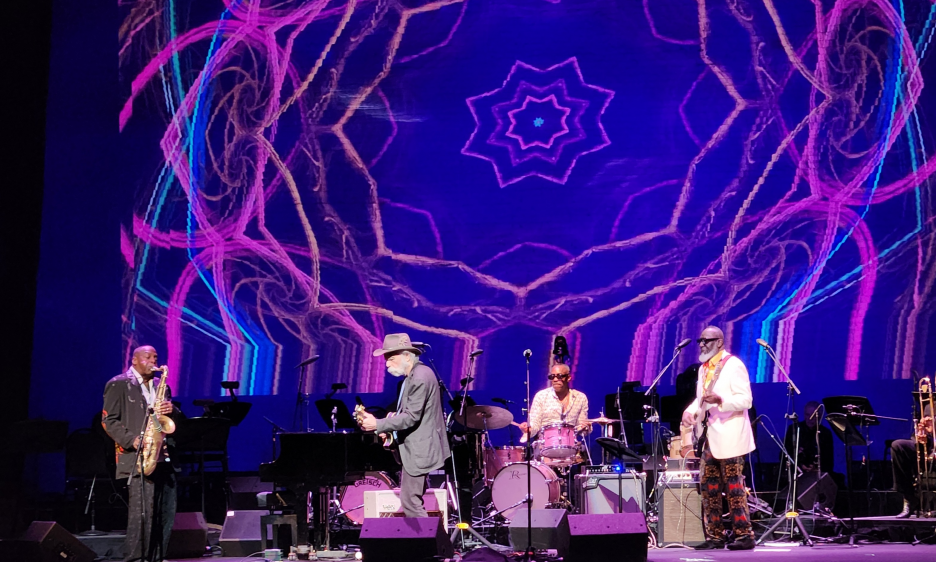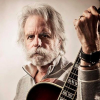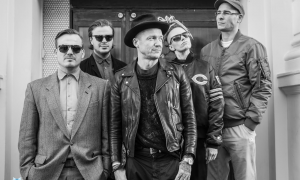Home » Jazz Articles » Live Review » Bob Weir and Others at the Jazz Foundation of America Ga...
Bob Weir and Others at the Jazz Foundation of America Gala Concert at the Apollo Theater

Courtesy Paul Reynolds
The Apollo Theater
Jazz Federation of America Gala
New York, NY
March 28, 2024
At gala concerts for worthy groups, it's understandably easy for the music to play second fiddle to the organization itself—and the desire to support it. But ,carefully curated, these events can yield memorable and unique performances and other moments.
So it was last Friday at the Apollo Theater, in Harlem for the annual celebratory fundraiser for the Jazz Federation of America, the cherished 34-year-old organization that employs and supports jazz musicians in need—more than 1,200 of them in 2023 alone. Between acts, the gala featured touching accounts of how the JFA has helped—through providing gigs, paying medical bills and more—such icons as Bertha Hope and George Cables.
The emotional power of those videos was more than matched by the figure of Sun Ra stalwart Marshall Allen, weeks shy of his 100th birthday, receiving his Lifetime Achievement award from longtime JFA board member Danny Glover.
Allen's energy and commitment was a wonder as he led the Sun Ra at the Apollo. Nearly 30 years after Sun Ra himself left Planet Earth, perhaps for his purported native home of Saturn, his namesake ensemble sustains its incomparable pastiche of scrappy big band, drawn stylistically from all eras of the genre, with overlays of avant-garde sound and various cosmic trappings—from space-themed lyrics to Egyptian-themed band costumes. The spectacle can make it easy to miss how well the Ra band actually plays.
Women singers drove the night to its most exuberant peaks. Jazzmeia Horn, regal in appearance and voice, employed her dazzling range and steely control to bounce syncopated vocal lines over airtight accompaniment from Victor Gould, Jason Clotter, and Michael Reed.
An all-star 100th-birthday tribute to Max Roach, led by Charles Tolliver, became the domain of the characteristically charismatic Dee Dee Bridgewater. In exquisite voice, Bridgewater brought the set to multiple peaks, from a gospelish catharsis around the repeated line 'sinner, you better answer' to a conversational exchange with George Coleman, with Bridgewater's scatting goading the seated 89-year-old tenor player to respond in burbling, echoing phrases.
The Roach tribute honored three other octagenarians, as "drum titans" who followed in Roach's wake and remain active today. Unfortunately, honoree Al Foster couldn't make it, so Louis Hayes and Billy Hart joined forces with Jeff Tain Watts. The trio's enmeshed playing never became a drum battle, exactly, but it did sustain the expected, expert tangle of rhythms and polyrhythms.
The gala's Musical Director (and soon-to-be Rolling Stones tour drummer) Steve Jordan, was the night's MVP, appearing with the show's several non-jazz acts. Jordan impressed not only for the bedrock power and dependability of his playing but for his sound, including the rich sonority of his tom-tom fills and bass drum.
Jordan stood out, for example, in an otherwise rote trio rendition of "Why Can't We Live Together," with Matthew Whitaker on organ and vocalist Alexis Morrast. The sometime Stone sustained the song's signature pulse, relaxedly yet urgently, on a gorgeous half-sized drum kit. Later, accompanied only by DJ Mixmaster MIke, Jordan unleashed his full force (on a full-sized kit) in backing hip-hop artist Chuck D, another Lifetime Achievement honoree. The set included "Fight the Power," the hit from D's band, Public Enemy.
Jordan was also in the drum seat for the unlikely closing set by Bob Weir the longtime Grateful Dead guitarist. The spoken introduction of Weir put into context his jazz influences, saying—accurately—that his singular rhythm guitar style was shaped as much by the harmonic sophistication of pianist Bill Evans as the blues influence that inspired most other rock guitarists who emerged in the '60s.
Weir's performance—with the eclectic trio of Jordan, Jamaaladeen Tacuma on bass and David Murray on tenor—was a creeping, low-key affair with a minimalistic, even skeletal, sound. The Dead icon kicked off with "I've Got You Under My Skin," playing slightly off-kilter accompaniment that evoked swing guitarists and giving Murray plenty of space for powerful, declamatory soloing.
Grateful Dead-style, the quartet segued into a short jam that soon transitioned into a long, meandering version of the dreamy Dead staple "Bird Song." The song choice, and Murray's forceful extended solo, evoked an epic and cherished version the Dead performed 34 years ago, almost to the day, at the Nassau Coliseum, with Branford Marsalis as the Dead's special guest.
Weir then turned to the blues, through two other Dead standards. "West LA Fadeaway," a late-career band standard, simmered soulfully before the musical temperature rose for the closer, "Turn on Your Lovelight," a frequent feature of the Dead's pre-1973 sets. The song brought to the fore a three-man horn section, comprising Eddie Allen on trumpet, Patience Higgins on saxophone and Clifton Anderson on trombone. They played the song's repeating horn figure, famous from the 1961 hit version by Bobby Blue Bland—who had a long and indelible history on the Apollo's stage.
A song so integral to both an iconic rock band and the evening's iconic venue was a fitting close to an evening that satisfyingly spanned every celebrated jazz genre, as well as venturing beyond those.
Tags
Live Review
Bob Weir
Paul Reynolds
Bobbi Marcus Public Relations
United States
New York
New York City
Apollo Theater
Bertha Hope
George Cables
Marshall Allen
Sun Ra Orchestra
Jazzmeia Horn
Dee Dee Bridgewater
Al Foster
Louis Hayes
Billy Hart
Jeff Tain Watts
Steve Jordan
Matthew Whitaker
Alexis Morrast
Chuck D
Grateful Dead
Bill Evans
Jamaaladeen Tacuma
David Murray
Branford Marsalis
Eddie Allen
Patience Higgins
Clifton Anderson
Bobby Blue Bland
Charles Tolliver
George Coleman
PREVIOUS / NEXT
Support All About Jazz
 All About Jazz has been a pillar of jazz since 1995, championing it as an art form and, more importantly, supporting the musicians who make it. Our enduring commitment has made "AAJ" one of the most culturally important websites of its kind, read by hundreds of thousands of fans, musicians and industry figures every month.
All About Jazz has been a pillar of jazz since 1995, championing it as an art form and, more importantly, supporting the musicians who make it. Our enduring commitment has made "AAJ" one of the most culturally important websites of its kind, read by hundreds of thousands of fans, musicians and industry figures every month.



























